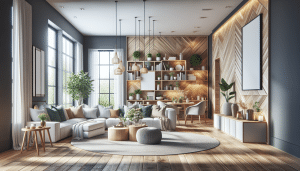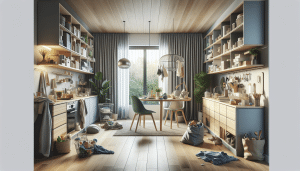Easy Decluttering Habits You Can Start Without Stress
Jessica White September 25, 2025
Discover simple decluttering habits designed for busy lives. This guide explores actionable steps, the surprising benefits of a tidy home, and creative storage ideas. Learn how lifestyle tweaks can transform your environment and well-being while incorporating key decluttering and home organization strategies.
Why Decluttering Matters for Your Lifestyle
Having a messy or cluttered living space can create daily challenges for anyone. Items pile up. Finding things takes longer. The stress can add up quickly. However, developing decluttering habits isn’t just about cleaning; it’s about improving your lifestyle. Studies indicate that living in an organized space supports better focus and mental health. Individuals who develop simple home organization routines often find daily tasks less draining and more manageable over time. It’s not about having a showroom-ready house; it’s about making space work for you and your needs.
Clutter often sneaks up in small ways—a pile of unopened mail, kitchen gadgets filling every drawer, or clothing overflowing from the closet. Home organization experts recognize that small, daily changes have the strongest impact over time. Tackling even one drawer or shelf per week can gradually lead to big results. The reduced stress and improved efficiency can carry over into other areas of your life, including relationships and productivity at work. By focusing on consistent, achievable habits, decluttering can feel less overwhelming and more rewarding.
Research connects clutter-free living with emotional well-being. When your physical space is calm and ordered, it’s easier to relax and recharge. This reflects in self-care routines and entertainment choices as well. For many, lifestyle adjustments start at home. The act of simplifying a room encourages a sense of accomplishment and clarity. This isn’t about perfection—it’s about meaningful progress that fits unique needs and personal schedules. Embracing a clutter-free lifestyle can influence everything from sleep quality to social confidence, making even small changes truly valuable (Source: https://www.apa.org/news/press/releases/2019/03/clutter-mental-well-being).
Building Simple Decluttering Habits That Last
Long-lasting change often comes from small steps. This is especially true when creating decluttering habits. Many people believe a big cleaning spree is the only solution, but maintaining a tidy space usually relies on integrating minutes of effort into daily routines. A helpful tip is to assign a purpose to each room. For example, keep only reading materials in the living area. By consistently returning items to their designated spots, organization becomes almost automatic. These tiny adjustments eventually lead to larger transformation, improving everything from daily comfort to overall peace of mind.
Habit stacking—linking a new behavior to an existing daily ritual—can make decluttering more manageable. Consider pairing clearing off your kitchen counter with your morning coffee routine or organizing entryway shoes each time you return home. The more effortless you make these actions, the more likely they’ll become part of your lifestyle. It’s also helpful to create reminders. Visual cues like a donation bag by the door or an inbox for mail can cue you to act without overthinking. Home organization doesn’t have to be a chore—turning it into a game with goals or rewards can boost motivation as well.
Consistency is crucial for building habits that stick. Setting aside just ten minutes at the same time daily has proven to help maintain a clutter-free space. Some find it helpful to involve family or roommates. Turning on music or setting a timer brings energy and fun into the process. Over time, repeated habits will reduce overall clutter, require less effort, and make staying organized feel natural. These processes emphasize that lifestyle improvements are grounded in everyday habits rather than sudden overhauls (Source: https://www.niehs.nih.gov/health/topics/conditions/clutter).
The Emotional Benefits of a Tidy Home
It’s common to underestimate the emotional impact of a cluttered home. Yet, research shows that surrounding yourself with less mess and more order can affect mood and mental clarity. Many people report feeling calmer and more alert after removing excess belongings. This is especially clear in living and sleeping areas. A tidy space not only looks appealing but also signals to the brain that it’s time for focus or relaxation. The work put into home organization pays off through better sleep and reduced daily anxiety.
The benefits extend to relationships as well. Shared living often leads to disagreements about cleanliness or organization. When spaces are managed using clear, agreed-upon routines, tension can ease. It becomes easier for everyone to unwind and enjoy activities together. Friends and family often notice the encouraging atmosphere of a clean home. These positive emotions can even have a ripple effect, motivating others in social circles to adopt similar habits. Improving your environment supports a lifestyle centered on happiness and connection.
A connection exists between clutter and self-esteem. Finishing small organizational tasks builds a sense of accomplishment. Success in one area—like a cleared closet—can encourage individuals to take on bigger projects in other parts of life. Physical environments often mirror internal states. Therefore, intentionally shaping your home environment can empower greater confidence and well-being. These changes, while subtle, can lead to lasting improvements across lifestyle and entertainment experiences alike (Source: https://www.ncbi.nlm.nih.gov/pmc/articles/PMC4803390/).
Storage Solutions and Tricks That Really Work
Effective storage is a secret weapon for home organization. Smart storage ideas don’t have to be expensive or complicated. Simple bins under the bed, wall-mounted hooks, or labeled boxes can make a huge difference. For smaller homes or apartments, it’s wise to use vertical space. Installing shelves or stackable containers keeps floors open and items visible. This streamlines daily routines and prevents things from piling up. Many people discover unused kitchen or closet areas during the organizing process, offering more flexibility and less clutter overall.
Repurposing furniture can maximize space without major purchases. Consider multifunctional items like ottomans with storage or bookshelves that double as room dividers. Organizing by category—such as grouping similar shoes or grouping stationery—can save time searching. Clear containers also help, letting you quickly see what’s inside before opening. For families, personalized baskets encourage everyone to put items away. Storage solutions are most effective when tailored to unique household needs and habits, reinforcing the value of personalization in home design.
Decluttering habits work well alongside regular reviews of what’s actually used and valued. Every few months, review spaces and reorganize as lifestyles change. Seasonal storage swaps—rotating clothes or decorations—keep things fresh and prevent accumulation. Donation and recycling bins should be easily accessible to encourage letting go of items. Embracing creative storage options transforms the decluttering process into a lifestyle upgrade. Even the simplest tricks can inspire you to enjoy a more streamlined and inviting home (Source: https://www.hgtv.com/lifestyle/clean-and-organize/organization-tips-that-actually-work).
How Decluttered Spaces Inspire Entertainment at Home
Tidy homes often become hubs for entertainment and relaxation. With clear surfaces and organized common spaces, hosting friends and family feels easier. Those who develop intentional lifestyle routines tend to use their living areas for movie nights, game evenings, or shared meals. A decluttered environment means set-up and clean-up happen quickly. Visitors are more comfortable, and hosts can focus on creating memories, not on scrambling to hide clutter before guests arrive.
Minimal design and smart storage lend to more versatile gathering spaces. With furniture easily rearranged and open spaces available, events can adapt to many interests—from crafting projects to casual get-togethers. Some find that reducing possessions allows for thoughtful decorations or seasonal updates that refresh the atmosphere. Entertainment becomes an act of sharing intentional space rather than worrying about what to put away. This freedom shapes a welcoming lifestyle enjoyed by everyone involved.
Encouraging regular decluttering can help children and teens take pride in their spaces and develop good habits early on. Family activities like sorting toys, setting up movie stations, or organizing board games provide opportunities for bonding and learning. When storage solutions make it simple to store everything after use, routines develop naturally. Organizing for entertainment gives each household member a role, fostering responsibility and creativity. Homes transform into places where connection and enjoyment come first (Source: https://www.cdc.gov/healthyschools/features/clutter-free-schools.htm).
When to Seek Professional Help for Organization
Sometimes clutter feels overwhelming despite efforts. In these situations, professional organizers offer services tailored to specific needs. These experts provide practical advice, emotional support, and hands-on help to establish new routines. Many people benefit from an outside perspective—someone who can suggest solutions not previously considered. For households managing transitions, such as moving or downsizing, working with professionals can speed up the process and reduce stress.
Professional organizing services typically start with an assessment. Consultants listen to concerns, observe habits, and design systems that suit the household. They may recommend specific tools, teach effective sorting methods, or collaborate with family members. Over time, even a short consultation can create a framework for continued success. These services are also valuable for people experiencing significant life changes that impact routines or emotional attachments to possessions.
Access to professional organizers varies, but many organizations maintain directories for finding reputable local providers. Additionally, some nonprofit groups and community centers offer workshops in decluttering and home organization. Before hiring anyone, check reviews and credentials to ensure the right fit and a supportive experience. Reaching out for help is a positive step towards a flourishing lifestyle where your home works for you—not against you (Source: https://www.napo.net/page/about-organizing).
References
1. American Psychological Association. (2019). Clutter and mental well-being. Retrieved from https://www.apa.org/news/press/releases/2019/03/clutter-mental-well-being
2. National Institute of Environmental Health Sciences. (n.d.). Clutter and your health. Retrieved from https://www.niehs.nih.gov/health/topics/conditions/clutter
3. McMains, S., & Kastner, S. (2011). Interactions of top-down and bottom-up mechanisms in human visual cortex. Retrieved from https://www.ncbi.nlm.nih.gov/pmc/articles/PMC4803390/
4. HGTV. (n.d.). Organization tips that actually work. Retrieved from https://www.hgtv.com/lifestyle/clean-and-organize/organization-tips-that-actually-work
5. Centers for Disease Control and Prevention. (n.d.). Keeping clutter-free environments. Retrieved from https://www.cdc.gov/healthyschools/features/clutter-free-schools.htm
6. National Association of Productivity and Organizing Professionals. (n.d.). About professional organizers. Retrieved from https://www.napo.net/page/about-organizing








